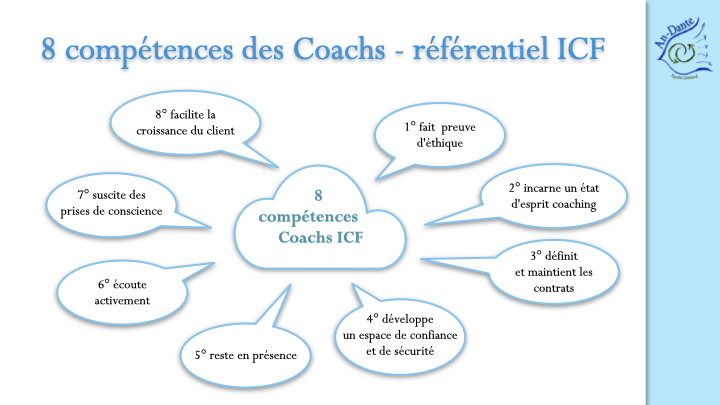Supervision and coaching are privileged relational spaces for the manifestations of the ethics of coaching and coaching, as well as the spirit of coaching.
What is ethics? What is the coaching spirit? While it is ambitious to answer this question in an article, let’s try to shed light on this question.
Focus on Ethics (Competency 1)
A regular stumbling block in coaching is the difference between consulting and coaching, or even therapy.
When formulating coaching goals, the client often asks for advice on how to accomplish this or that.
How then to welcome both his request, which is a manifestation of his representation of coaching and his ability to clarify his objective and clarify the difference between consultancy, coaching, therapy, facilitation?
How to use appropriate language to be heard? To meet the customer where he is, and accompany him to go where he wants? Or even to keep the freedom to position oneself in front of the customer as not being the right resource to meet his demand.
Privacy is also an essential part of the coaching space. It is one thing to verbalize it, it is another to ensure that it is effective. Both in the information exchanged verbally and in the information exchanged by electronic or other means (what are the general conditions of sale of the coach, how is he able to guarantee to his client – beneficiary of coaching, payer of coaching – his processes of conservation or deletion of data.
This also touches on the issue of consent. How to ensure that in the relationship with the customer, his consent is key, in the moment and in the long term?
This question is also to be clarified by considering “the client” as the beneficiary of the coaching, or as the company’s stakeholder(s) involved in the coaching (HR, manager, etc.).
Focus on the Coaching mindset (Skill 2)
A coach in a supervisory conversation tells how she prepares her sessions and imagines in advance what she will do as exercises with her client.
By unfolding the situation, she becomes aware of her fear of not being up to the task, the lack of confidence in her coaching abilities, her questions about her legitimacy, and the fact that this preparation blocks the session in a pre-written scenario, underpinned by pre-judgements, in contradiction with the “dance with the client” or the co-creation of the content of the live live session.
All boosted by judgments, towards herself ‘I am not competent enough’ and towards her client ‘she needs this’.
Through SuperVision’s reflective practice, this awareness leads him to work on his sense of competence (Emotional Governance), on the client’s responsibility in the session, on the co-management of the session (Adaptive Governance and Assertiveness).
This path is typical of the progression of the young coach just out of training towards a maturity that is refined over the course of the practice. The embodiment, or personification of the Coaching state of mind is a process that takes place over time. And this is what is evaluated in the external certifications/accreditations of coach associations, with different levels of coach maturity.
It also refers to the question of the ethics of the coach or supervisor (Competence 1), who is responsible for his reflective practice, supervision, professional development and maintenance of skills with external and independent advice.

Compétences du référentiel ICF
- Histoires de SuperVision #1
- Histoires de SuperVision #2
- Histoires de SuperVision #3
- Histoires de SuperVision #4
- Histoires de SuperVision #5
- Histoires de SuperVision #6
- Histoires de SuperVision #7
- Histoires de SuperVision #8